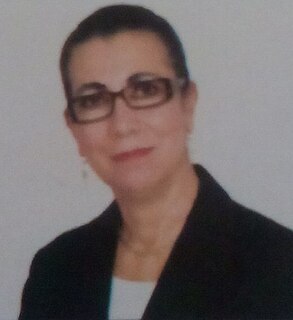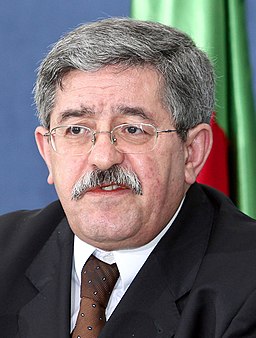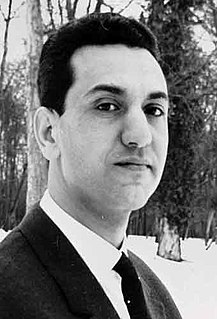The History of Algeria from 1962 to 1999 includes the period starting with preparations for independence and the aftermath of the independence war with France in the 1960s to the Civil War and the 1999 presidential election.

The Democratic National Rally is a political party in Algeria. It is led by the Prime Minister Ahmed Ouyahia. The party held its Second Congress on 15–17 May 2003.

The Movement for the Society of Peace is an Islamist party in Algeria, led until his 2003 death by Mahfoud Nahnah. Its current leader is Bouguerra Soltani. It is aligned with the international Muslim Brotherhood.
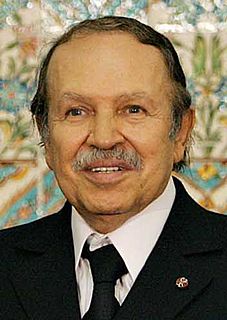
Presidential elections were held in Algeria on 8 April 2004. Incumbent President Abdelaziz Bouteflika was re-elected with 85% of the vote.
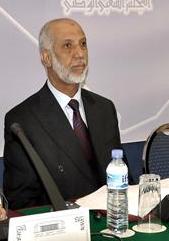
Abdelaziz Belkhadem is an Algerian politician who was Prime Minister of Algeria from 2006 to 2008. He was also Secretary-General of the National Liberation Front (FLN). Belkhadem served as Minister of Foreign Affairs from 2000 to 2005 and Personal Representative of President Abdelaziz Bouteflika from 2005 to 2006; after serving as Prime Minister from 2006 to 2008, he was again appointed as Personal Representative of the Head of State in 2008.

Algeria elects on national level a head of state - the president - and a legislature. The president is elected for a five-year term by the people. People's National Assembly has 462 members, elected for a five-year term in multi-seat constituencies by proportional representation. Eight seats in the national assembly are reserved for Algerians abroad. The Council of the Nation has 144 members, 96 members elected by communal councils and 48 members appointed by the president. Algeriawesh alors has a multi-party system, with numerous parties in which no one party often has a chance of gaining power alone, and parties must work with each other to form coalition governments. According to a US Embassy cable, the 2009 presidential elections were "carefully choreographed and heavily controlled", with the official turnout figure "exaggerated" by at least 45%.

Parliamentary elections were held in Algeria on 5 June 1997. The result was a victory for the National Rally for Democracy (RND), a new party created in early 1997 for President Zéroual's supporters, which won 156 out of 380 seats. They were followed by the Movement of Society for Peace with 69 seats, the FLN (62), and the Islamist Ennahda (34). The two Berberist parties, FFS and RCD, got 20 and 19 seats respectively. Views on this election were mixed; most major opposition parties filed complaints, and the success of the extremely new RND raised eyebrows. The RND, FLN, and MSP formed a coalition government, with the RND's Ahmed Ouyahia as prime minister.
The Sant'Egidio Platform of January 13, 1995 was an attempt by most of the major Algerian opposition parties to create a framework for peace and plan to end to the Algerian Civil War. The escalating violence and extremism, which had been provoked by the military's cancellation of the legislative elections in 1991 that the Islamic Salvation Front (FIS), an Islamist party, were expected to win, compelled the major political parties to unite under the auspices of the Catholic Community of Sant'Egidio in Rome. The community had previously played an important role in the drafting of the Rome General Peace Accords in 1992 which ended the civil war in Mozambique. The presence of representatives from the FIS as well as the National Liberation Front (FLN) and Socialist Forces Front (FFS) at these negotiations was extremely significant; the three parties collectively accounted for 80 per cent of the votes in the 1991 election.
General Mohamed Mediène, also known as Toufik (توفيق), was head of the Algerian secret services, the Intelligence and Security Department, from 1990 to 2015. He was described as the world's longest serving "intelligence chief".

Legislative elections were held in Algeria on 17 May 2007. 24 political parties and around 100 independent lists with a total of more than 12,000 candidates competed for the 389 seats in the National People's Assembly. While most Algerians voted on May 17, immigrants from Algeria to other countries and Algerians living in the Sahara and other nomads and semi-nomads voted on May 16 due to the distance from Algiers, the country's capital.

The 2002 Algerian Legislative election was held in Algeria on 30 May 2002 to elect members of the People's National Assembly. The governing National Liberation Front (FLN) won a majority of seats in the election. The election suffered from a low turnout, violence and boycotts by some opposition parties.

The 2010–12 Algerian protests was a series of protests taking place throughout Algeria, lasting from 28 December 2010 to early 2012. The protests had been inspired by similar protests across the Middle East and North Africa. Causes cited by the protesters included unemployment, the lack of housing, food-price inflation, corruption, restrictions on freedom of speech and poor living conditions. While localized protests were already commonplace over previous years, extending into December 2010, an unprecedented wave of simultaneous protests and riots, sparked by sudden rises in staple food prices, erupted all over the country starting in January 2011. These were quelled by government measures to lower food prices, but were followed by a wave of self-immolations, most of them in front of government buildings. Opposition parties, unions, and human rights organisations then began to hold weekly demonstrations, despite these being illegal without government permission under the ongoing state of emergency; the government suppressed these demonstrations as far as possible, but in late February yielded to pressure and lifted the state of emergency. Meanwhile, protests by unemployed youth, typically citing unemployment, hogra (oppression), and infrastructure problems, resumed, occurring almost daily in towns scattered all over the country.
Events from the year 2012 in Algeria

The Green Algeria Alliance, short Green Alliance was an Islamist coalition of political parties, created on 7 March 2012 for the Algerian legislative election, 2012. It consisted of the Movement of Society for Peace (Hamas), Islamic Renaissance Movement (Ennahda) and the Movement for National Reform (Islah). The alliance was led by Bouguerra Soltani of the Hamas.

Presidential elections were held in Algeria on 17 April 2014. Incumbent President Abdelaziz Bouteflika was re-elected with 82% of the vote. Issues in the campaign included a desire for domestic stability after the bloody civil war of the 1990s, the state of the economy, the frail health of the 15 year incumbent and 77-year-old president whose speech was "slurred and inaudible" in his only public outing during the campaign, and the less-than-wholehearted support given the president by normally united and discrete ruling class.

Abdelmadjid Tebboune is an Algerian politician who was Prime Minister of Algeria from May 2017 to August 2017. Previously he was Minister of Housing from 2001 to 2002 and again from 2012 to 2017.










